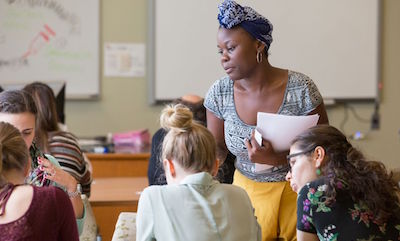In the Classroom: “Welcome to Malawi”.

The Peace Corps volunteers have almost reached Nkhotakota, a town in central Malawi, when a local woman stops them. “The bridge is broken,” she says.
The volunteers explain that they’re carrying six shipments of vaccines in a plastic bag cooled with ice packs, struggling to keep the vaccines from getting too warm on the 15-hour trip from Lilongwe, the capital. The woman says she will let them cross the bridge if they give her a vaccine for her child. They offer money instead, and the woman calls over a man standing nearby. He claims to be a police officer and threatens them. They offer a bigger bribe, and are allowed to cross.
Relieved, the volunteers arrive at the community health clinic—Room CT460 of the Medical Campus. They check the “vaccines”—a pack of popsicles, just beginning to melt after the long trip from the freezer one floor below. The teams of “volunteers” are SPH students in GH887: Planning and Managing Maternal and Child Health Programs in Developing Countries, and so are the “Malawian” couple from the bridge.
Each week in GH887, a different team of students leads a full class session. Assigned a central topic in maternal and child health, the team choses a country to provide the backdrop for the issue. They then create an entire workshop, providing background information about the health topic in their chosen country, determining workshop objectives, and developing practice-based learning activities.
“We try to simulate situations that students will likely encounter when they go out in the field, so our metaphor for these workshops is around training Peace Corps volunteers,” says James “Wolffy” Wolff, associate professor of global health, who co-teaches the course with Rachael Bonawitz, assistant professor of global health.
Four or five SPH graduates go into the Peace Corps each year, Bonawitz says, “and they write us and say, ‘Thank you, this is exactly what I had to do when I landed in Albania, this is exactly what I had to do when I got to Peru,’ so we know it works for them.”

“Even if the students don’t become Peace Corps volunteers,” Wolff adds, “the training and facilitating skills they are learning are fundamental to maternal and child health jobs both globally and in the US.”
Students agree.
“It’s very necessary for us to have that hands-on practice, especially for an issue that’s not really prevalent here in the United States,” says Weyu Hodge, one of the students who led the Malawi workshop. Setting the workshops in a specific country, Hodge adds, helps students put aside generalizations and look at the facts on the ground: “It’s important to think of it in context.”
Also, Wolff says, “It’s just more fun.”
Another recent scenario involved a demonstration of malaria rapid diagnostic tests (RDTs). Using case studies of children who might have malaria, students took on the role of clinic health workers. They evaluated the symptoms and diagnostic information from the RDTs, then decided courses of treatment for malaria—or, in some cases, entirely different diseases.
In another exercise, the “Peace Corps volunteers” designed public awareness campaigns around immunizing children and the proper use of mosquito nets, taking into account challenges like low literacy rates in these regions of Malawi, distrust of medical workers from outside the community, and the widespread use of mosquito nets for fishing.
The vaccine transportation scenario helped illustrate the concept of the “cold-chain,” a system of moving vaccines through a country while keeping them at the optimal temperature. Getting stopped at the bridge was only the last of a series of challenges in the simulation, including developing budgets and selecting supplies with limited funds, writing memos, and plenty of waiting around—for instructions, money, visas, and even a bus driver.
Wolff says such role-playing could have helped him during his own stint in the Peace Corps in Mali some years ago. When he arrived in the country, the first thing he did was drive 11 hours transporting vaccines. He arrived at his destination exhausted and went to bed. The next morning, the vaccines “were in a puddle of water,” too warm to be used.
“It was a bad start,” he says. “If I had taken this workshop, I would have avoided that.”